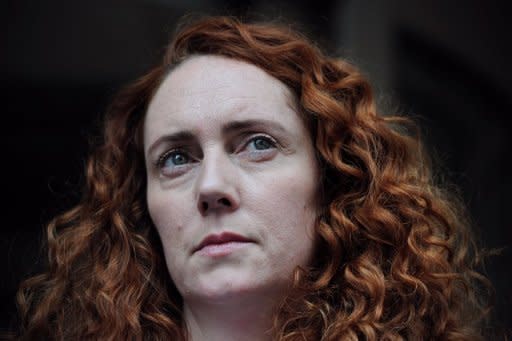British ex-PM Brown blasts Murdoch press at inquiry
Former British prime minister Gordon Brown repeatedly criticised Rupert Murdoch's newspapers in his evidence to a press ethics inquiry Monday, denying his policies were ever influenced by the tycoon. Brown, Labour premier from 2007 to 2010, blasted Murdoch's Sun daily tabloid for its "sensationalised" coverage of the war in Afghanistan and for its decision to reveal in 2006 that Brown's son had cystic fibrosis. Brown said he "absolutely" denied that his wife gave consent for the story to be published, contradicting claims by Rebekah Brooks, The Sun's editor at the time, when she gave evidence to the Leveson Inquiry last month. Kicking off a week in which both of Britain's main political parties will face intense scrutiny of their ties with Murdoch's News Corp., Brown said it was "ridiculous" to suggest Murdoch exerted undue influence on his government. "I understood, I think, quite a lot about his Scottish background," Brown, who is Scottish, said of the Australian-born tycoon at the inquiry, which was set up in the wake of the phone-hacking scandal at Murdoch's News of the World weekly tabloid. "But the idea that I was influenced in what I did by Mr Murdoch's views is faintly ridiculous." Laughing, he said Murdoch would have wanted Britain to leave the EU and "probably would have had us at war with France and Germany". "Mr Murdoch has very strong views," said Brown, wearing a dark suit with a purple tie. "He's entitled to these views. But the idea that I was following those views is just absolute nonsense." Brown also denied Murdoch's claim that he telephoned the tycoon threatening to "make war" on News Corp. after The Sun, Britain's biggest-selling paper, switched support to the Conservatives before the 2010 election. Brown, whose Labour party subsequently lost the election after 13 years in power, said: "There was no such conversation." He also criticised Murdoch's son James, who resigned as executive chairman of News Corp.'s British newspaper wing over the phone hacking scandal, for his aggressive pursuit of deregulation in the British media industry. He described a 2009 lecture by James Murdoch criticising the size of the BBC and the interference of media watchdog Ofcom as "breathtaking in its arrogance and ambition". Current finance minister George Osborne was due to appear at the inquiry later on Monday, while Prime Minister David Cameron will give a full day of evidence on Thursday. Cameron set up the Leveson Inquiry in July after revelations that Murdoch journalists hacked into the voicemail messages of a murdered schoolgirl prompted a wave of public revulsion, forcing the News of the World to close. But his own government has come under fire after evidence at the inquiry exposed the Conservative-led coalition's closeness to the Murdoch press. Culture minister Jeremy Hunt has been battling calls to resign since it emerged at the inquiry in April that his office leaked information to News Corp. about its bid to take full control of pay-TV giant BSkyB. News Corp. was forced to drop the BSkyB bid as the hacking scandal unfolded. The inquiry, led by senior judge Brian Leveson, is due to produce a report in October that will likely include recommendations on the future of press regulation and a probe into the extent of journalists' illegal activities. More than 40 people have been arrested by police investigating phone hacking and alleged bribery of public officials by News Corp. journalists.




